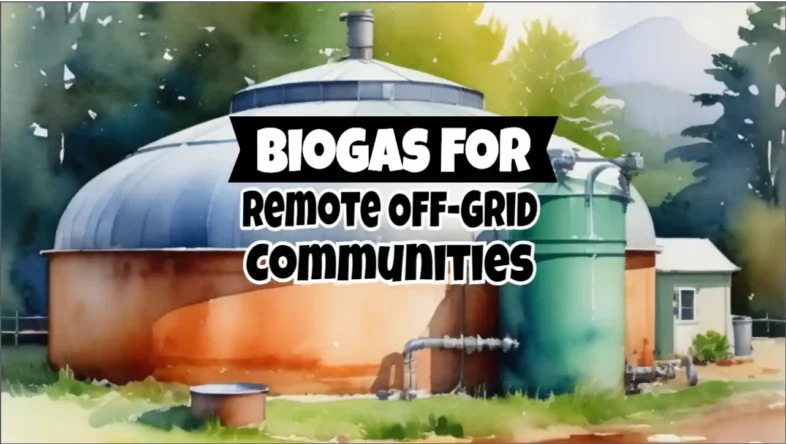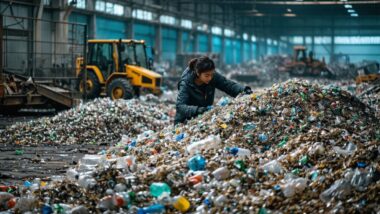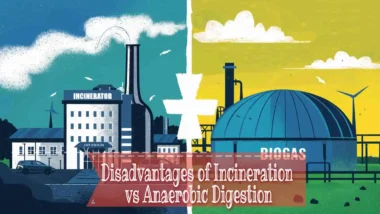Biogas off-grid is an ideal energy for remote communities and homes far from the nearest power lines.
Living off-grid can be rewarding, but it also comes with its own set of challenges. Many remote communities struggle with unreliable energy sources and high costs of fuel. 1 Without easy access to electricity or clean cooking gas, daily life becomes harder. 2
Biogas production using the anaerobic digestion process offers a sustainable solution by turning organic waste into clean energy when living in locations that are off the grid. This means less pollution and more reliable power for your home or community, even if you are already using solar power.
This article will explain how biogas works and the many benefits it provides. You'll learn ways to implement biogas systems in your community, cutting down on waste and lowering energy costs.
Keep reading to discover how biogas can transform off-grid living!
Key Takeaways
- Biogas transforms organic waste, such as food scraps and animal manure, into clean fuel. This process reduces greenhouse gas emissions by about 10% and provides reliable energy for cooking and heating.
- Switching to biogas systems can cut down on energy costs by up to 50%, while also reducing carbon emissions by nearly 40%. It offers a cheaper alternative to expensive diesel generators or LPG in off-grid communities.
- HomeBiogas systems offer an easy installation option for households. Priced at $720 plus shipping, these digesters can provide up to six hours of cooking gas daily and produce valuable liquid bio-fertiliser for farming.
- Community biogas digesters use larger volumes of organic waste to generate sustainable energy. They help reduce deforestation, lower air pollution, and support local economies with consistent power supplies.
- Education programmes empower communities by teaching essential skills in biogas system management. Government support plays a critical role in promoting the adoption of renewable energies through financial aid and technical assistance initiatives.
The Need for Clean Energy in Remote Off-Grid Communities
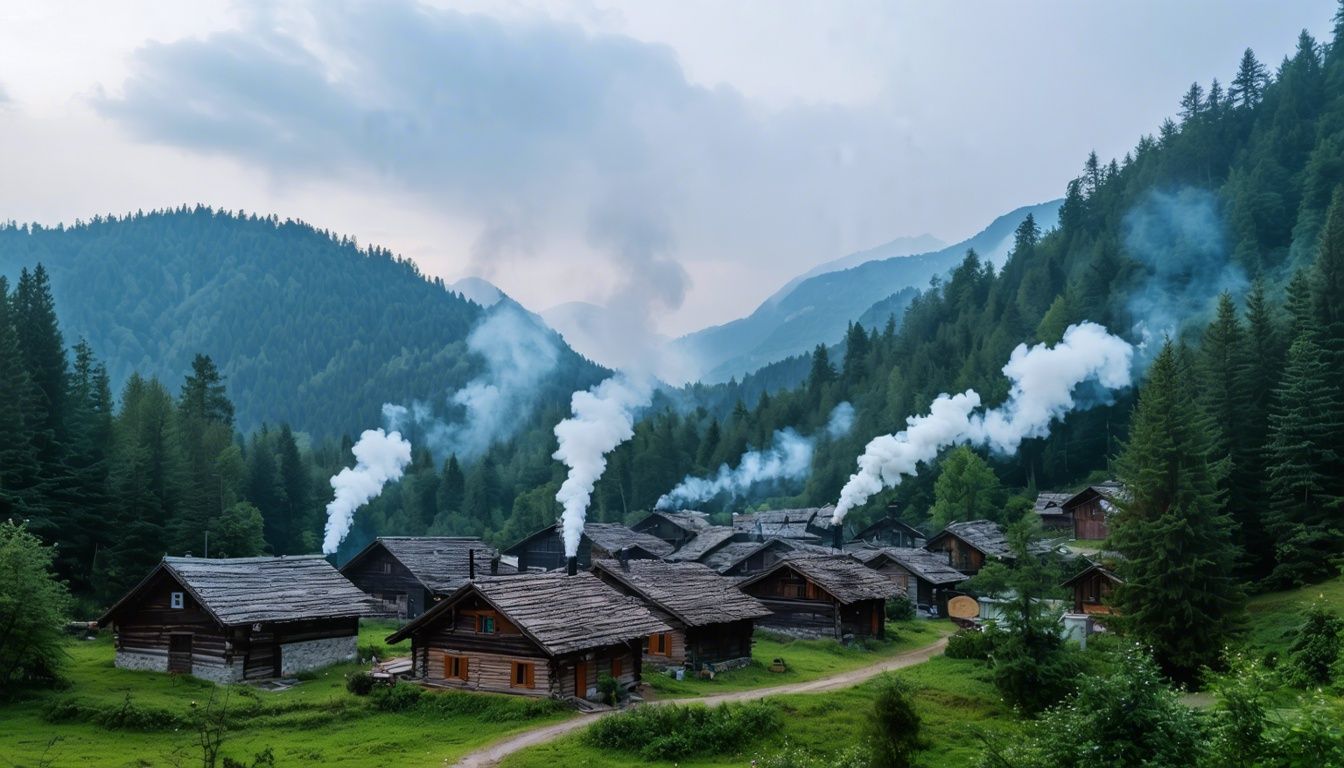
Many remote communities rely on burning wood or coal for their energy needs. This is harmful to the environment and can lead to health problems.

Dependence on unsustainable sources
Relying on fossil fuels in off-grid communities is risky and costly. Diesel generators, for example, are expensive to run and release harmful greenhouse gases. 1 Off-gridders often struggle with high energy prices and pollution from these unsustainable sources.
Switching to renewable energy technologies could help solve these issues. Biogas offers a green alternative by using organic waste as fuel. This reduces reliance on diesel and lowers the carbon footprint of remote areas.
Energy savings can lead to more affordable living conditions.
Using biogas helps lower our carbon emissions while giving us clean energy, says Maria Sanchez, an off-grid homeowner.
Biogas systems also support sustainable food production through nutrient recycling in farming practices. Sustainable living becomes easier when communities turn waste into valuable resources like biogases for cooking stoves or tiny houses. 2
Lack of access to electricity
Many off-grid communities lack basic electricity. Without it, families rely on diesel and kerosene lamps. These are expensive and polluting. Hybrid renewable energy systems (HRESs) can help solve this issue by providing consistent power.
They reduce dependency on harmful fuels. 4
Lack of power affects daily life severely. Children cannot study after dark, and food spoils quickly without refrigeration. Clean energy like biogas offers hope for a sustainable future in these regions. 3
How Biogas Can Provide a Sustainable Solution
Biogas is produced from natural resources like food waste and manure. This green energy reduces greenhouse gas emissions and benefits the environment.

Using organic waste as fuel
Organic waste makes excellent fuel for biogas production. Using food scraps, animal manure, and other biodegradable materials, you can generate a clean energy source. For instance, six litres of organic waste daily can power two hours of cooking on a high flame. In the future, it may be possible to use dry anaerobic digestion also known as solid-state AD (SSAD) but for the present time the wet AD single-stage reactor type is almost always used; meaning that if insufficient waste is present, water is added to make a pulp or liquid feedstock material.
Animal manure also works; 20 litres provides the same cooking time.
Recycling organic waste into biogas reduces greenhouse gas emissions by about 10%. 5 This not only creates energy but also helps the environment. Homeowners off the grid benefit from lower energy costs and improved waste management. 6
Using organic waste for fuel is a smart way to turn trash into treasure. – Eco-friendly Solutions Advocate
Impact on the environment
Biogas uses organic waste to produce energy efficiently. This process can lower greenhouse gas emissions by -23.7% to -36.5%. 7 Upgrading biogas into biomethane reduces fossil fuel use and improves local air quality.
Proper management of digestate limits environmental damage, such as cutting down ammonia emissions and is much less damaging than spreading raw manure or dogging back in unwanted crop material.
Lower carbon production from biogas supports a greener lifestyle for off-grid homeowners. By converting waste into energy, it helps create a closed-loop system or circular economy model.
This means less pollution and more sustainable living environments in remote areas. Biogas ensures cleaner air and contributes positively to the fight against climate change. 8
Benefits of Biogas for Off-Grid Communities
Biogas transforms waste into a useful resource, providing clean energy. It also promotes a healthier and greener lifestyle for everyone involved.

Reduced waste
Portable biogas plants convert organic waste into biogas. This process reduces the need for landfills, lowering overall pollution. By using anaerobic digestion, foul odours are eliminated, making your environment cleaner and healthier. 9
Agricultural biogas plants also help in this practice. Crop residues and animal waste become valuable energy resources instead of being left to rot. Communities can enjoy a greener living space with less rubbish lying around. 5
Lower energy costs
Switching to biogas can save off-grid communities a lot of money. By moving away from LPG to biogas, households might see cost savings of up to 50% for cooking and heating. Off-grid homes using biogas could lower their energy costs while also cutting down on carbon emissions by nearly 40%. 10
Biogas systems use organic waste as fuel, which is often free or very cheap. This process reduces the need for expensive natural gas or electricity imports. Families can spend less on energy and more on other essentials like food and education. 11
Improved sanitation
Bio-toilets can transform human waste into usable resources. These toilets operate odour-free and mess-free, making them perfect for off-grid homes. They remove waste efficiently while also creating biogas that powers your energy needs.
This closed-loop system ensures you always have a clean and sustainable bathroom experience.
Biogas systems reduce harmful methane emissions from livestock as well. 6 You not only get a greener way to manage waste but also contribute positively to the environment. Cleaner surroundings mean fewer diseases, promoting better health in remote communities. 5
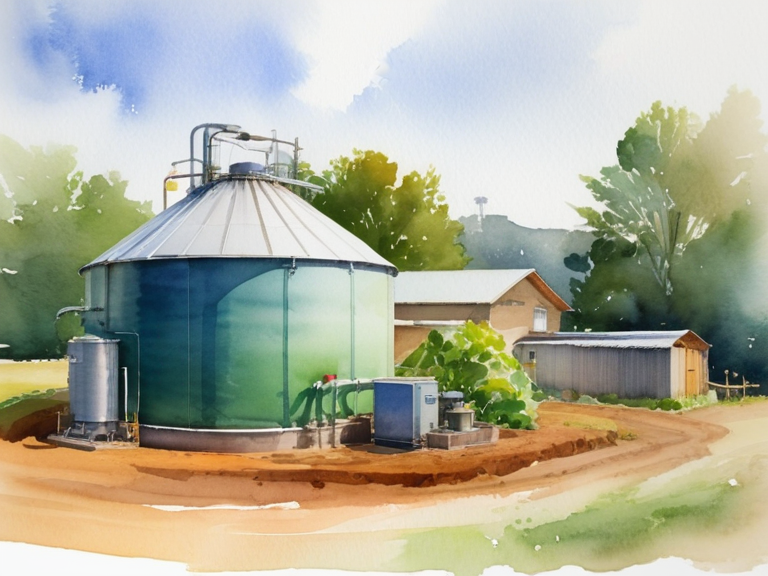
Enhanced farming
Biogas helps farms grow better. The bio-slurry left after making biogas is a fantastic fertiliser. It boosts plant growth, rich in macro and micronutrients. Farmers use this to get bigger and healthier crops. 13
This fertiliser also fights plant diseases, keeping fields green and healthy. With richer soil, farmers need fewer chemicals which saves money and keeps the environment safe. Biogas means more robust ecosystems for everyone in off-grid communities. 12
Ways to Implement Biogas in Remote Off-Grid Communities
Use simple biogas systems at home. Set up community biogas digesters for shared use. Teach people how to use and maintain these systems. Encourage government support for funding and initiatives.
Work with local partners for successful implementation.
Read more!
HomeBiogas systems
HomeBiogas systems convert organic waste into clean cooking gas. 15 This makes them perfect for off-grid homes. For $720 plus shipping, you can get the HomeBiogas digester 2.0. It provides up to 6 hours of cooking gas daily. 14
This system also produces liquid bio-fertiliser, which helps improve farming soil. By using it, you reduce waste and lower energy costs. It's a green lifestyle choice that impacts the environment positively while increasing energy security in remote areas.
Community biogas digesters
HomeBiogas systems are great for individual homes, but what about whole villages? Community biogas digesters provide a sustainable source of energy for cooking and heating. These larger setups use organic waste, like food scraps and animal manure, to produce biogas.
This reduces reliance on traditional fuels such as wood, which decreases deforestation and air pollution. 16
These community digesters have been implemented in rural villages and small-scale farms. They help convert waste into valuable energy while significantly reducing greenhouse gas emissions. 16 People can enjoy lower energy costs and improved sanitation as a result. Installing these systems supports both the environment and local economies by providing consistent, clean energy off the grid. 17
Education and training
Training programmes empower communities to create and maintain biogas projects autonomously. 18 These programmes teach important skills like feedstock management and system design.
They also offer hands-on demonstrations, seminars, workshops, and online courses.
Educational efforts cover creating energy with organic waste, which reduces the community's environmental impact. 19 Learning how to manage the systems helps ensure long-term success.
Local residents can become experts in using anaerobic digesters for energy production.
Government support for off-grid biogas plants.
Government backing plays a huge role in promoting biogas use in off-grid communities. They should adopt smart economic strategies to set up more biogas facilities. 12 Providing owner training and technical support is key.
This makes it easier for people to understand and maintain the systems both on the grid and for biogas off-grid.
Removing financial and political barriers encourages farmers to build their biogas plants, leading to lower energy costs. 20 Working with local experts can help spread knowledge about using organic waste for fuel.
With these efforts, governments can push towards net zero goals whilst fostering economic growth in remote areas.
Collaboration in Building Biogas Off-Grid Installations with local partners
Government backing is crucial for biogas projects, but local partnerships make a huge difference too. They provide the necessary groundwork and trust within communities. NGOs and social-minded organisations can work hand-in-hand with farmers to boost resilience.
The UNHCR has taken steps in this direction by rolling out renewable-energy-based biogas projects in Mauritania. 6 Partnerships with groups like the United Nations Development Programme (UNDP) and Deutsche Gesellschaft für Internationale Zusammenarbeit (GIZ) also play an important role.
These collaborations ensure that remote off-grid areas get the support they need to install effective biogas systems. 19
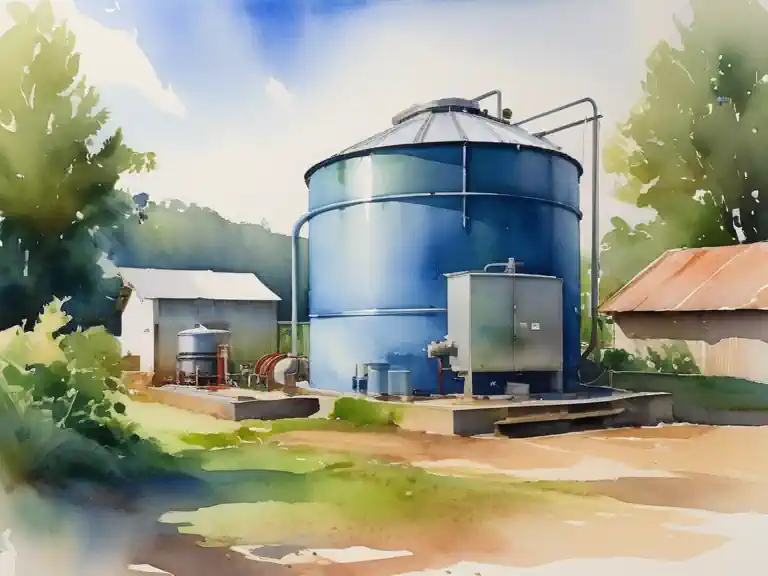
Biogas Off-Grid – Conclusion
Biogas offers a lifeline to remote off-grid communities. It uses waste to create clean fuel, reducing rubbish and cutting energy costs. Farmers can get bio-fertiliser to boost crop growth while slashing emissions.
HomeBiogas systems are easy to set up and handle, providing vital energy solutions. These efforts empower communities and foster self-sufficiency. Start your green journey with biogas today!
FAQs for Biogas Off-Grid
1. What is biogas and how does it help remote off-grid communities?
Biogas is a type of renewable energy made from organic waste through anaerobic digestion. It helps remote off-grid communities by providing a reliable source of energy.
2. How do cows contribute to biogas production?
Cows produce manure, which can be used in anaerobic digesters to create biogas. This process also helps with waste removal.
3. Is there any special infrastructure needed for biogas off-grid production?
Yes, you need infrastructure like anaerobic digesters and transport systems to collect and process the waste into biogas.
4. Can investing in biogas benefit affordable housing projects in these areas?
Yes, investments in biogas can provide affordable housing projects with a sustainable energy source, reducing costs related to traditional power sources.
5. What are the other benefits of using biogas off-grid for remote communities?
Using biogas reduces reliance on meat-based fuels, supports local economies through investments, and promotes environmental sustainability by managing cow waste effectively.
References for Biogas Off-Grid
- ^ https://www.irena.org/Publications/2023/Nov/Renewable-energy-for-remote-communities-A-guidebook-for-off-grid-projects (2023-11-24)
- ^ https://www.sciencedirect.com/science/article/pii/S0048969719364411
- ^ https://www.researchgate.net/publication/351721419_Off-Grid_Hybrid_Electrical_Generation_Systems_in_Remote_Communities_Trends_and_Characteristics_in_Sustainability_Solutions
- ^ https://www.sciencedirect.com/science/article/pii/S1364032121003269
- ^ https://www.sciencedirect.com/science/article/pii/S0301479723022466
- ^ https://www.mdpi.com/2571-8797/6/2/23
- ^ https://www.tandfonline.com/doi/full/10.1080/10934529.2018.1459076
- ^ https://www.researchgate.net/publication/259784101_Environmental_impacts_of_biogas_utilisation_pathways
- ^ https://www.linkedin.com/pulse/portable-biogas-plants-solution-waste-management-lead-generation
- ^ https://www.sciencedirect.com/science/article/pii/S2590174523001642
- ^ https://www.veolia.co.uk/what-are-benefits-biogas
- ^ https://www.ncbi.nlm.nih.gov/pmc/articles/PMC9469062/
- ^ https://onlinelibrary.wiley.com/doi/10.1155/2022/8750221
- ^ https://www.homebiogas.com/blog/off-grid-energy-solutions/ (2024-01-16)
- ^ https://www.homebiogas.com/
- ^ https://www.worldbiogasassociation.org/wp-content/uploads/2019/07/WBA-globalreport-56ppa4_digital.pdf
- ^ https://www.canadianbiomassmagazine.ca/digesting-the-north-balance-biogas-is-bringing-digesters-to-rural-and-remote-communities/ (2023-05-16)
- ^ https://www.expresswatersolutions.com/biogas/educational-and-training-programs-for-biogas-projects/ (2024-03-26)
- ^ https://www.sciencedirect.com/science/article/pii/S2211467X19301075
- ^ https://www.europeanbiogas.eu/wp-content/uploads/2020/12/EBA-Long-term-vision-for-rural-areas.pdf


